Key takeaways:
- Conserving nature is essential for maintaining our connection to beauty, essential resources, and biodiversity, impacting both current and future generations.
- Personal experiences in nature, such as camping and gardening, highlight the profound restorative effects on mental well-being and emotional health.
- Active community involvement in conservation fosters a sense of duty and collective action, reinforcing the importance of preserving natural spaces for future generations.
- Small personal actions, like using reusable products and volunteering, can lead to significant positive changes in conservation efforts and enhance our connection with nature.
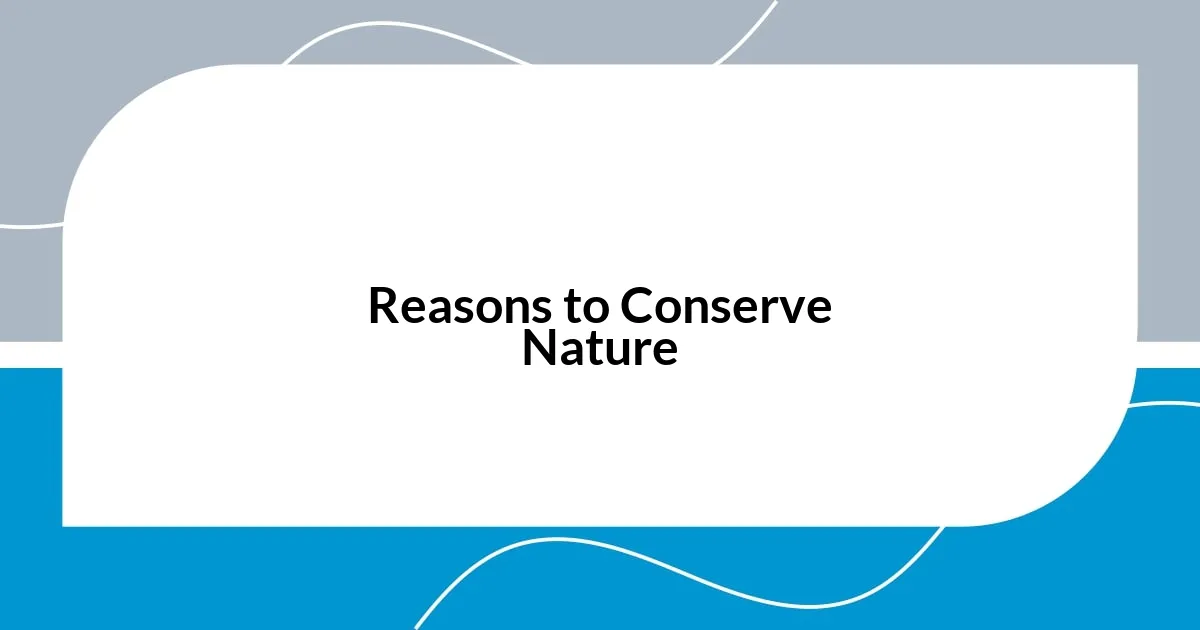
Reasons to Conserve Nature
One of the most compelling reasons to conserve nature is the undeniable connection we have with it. I often find myself reflecting on my childhood, where endless afternoons were spent wandering through lush forests and feeling a deep sense of wonder. Isn’t it incredible how those experiences shape our understanding of beauty and tranquility? Losing those havens would mean losing a part of ourselves.
Moreover, nature provides us with essential resources like clean air, water, and food. I remember hiking in a remote area and being struck by how the crisp, fresh air invigorated my spirit. It made me realize how vital it is to protect these environments, not just for ourselves but for future generations. Can we afford to jeopardize such treasures?
Lastly, conserving nature plays a critical role in maintaining biodiversity, which is fundamental to our ecosystem’s health. I once visited a nature reserve and marveled at the variety of species cohabiting in harmony. Each one has a role to play, and their extinction could disrupt that balance. How can we ignore our responsibility to protect these intricate relationships?
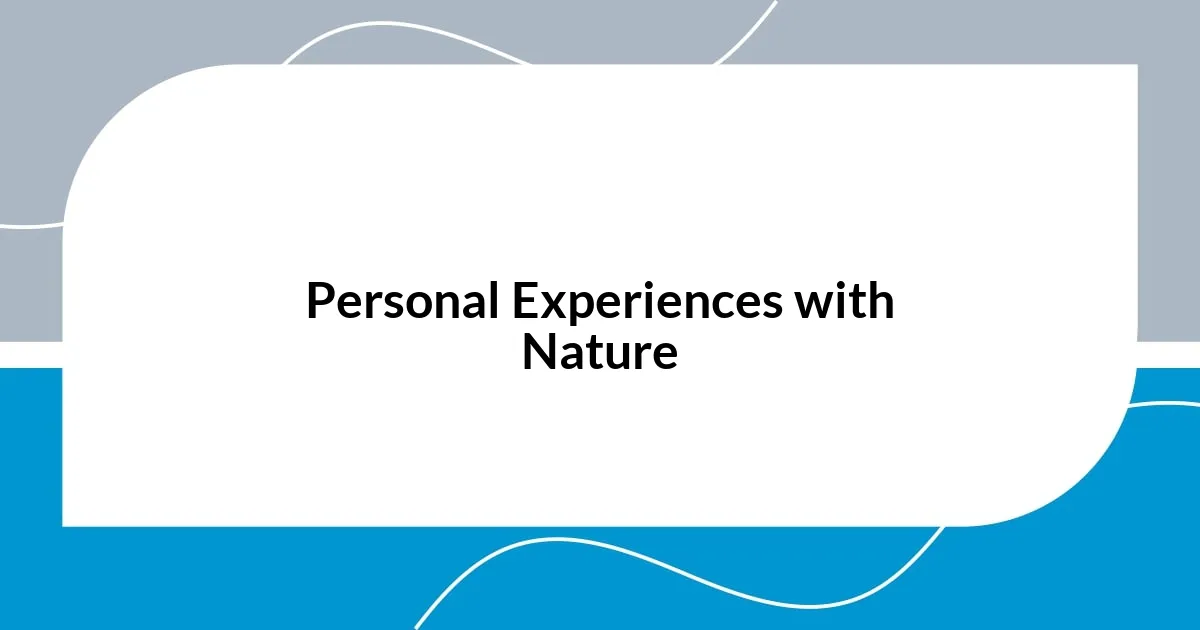
Personal Experiences with Nature
There’s something profoundly grounding about immersing myself in nature. One summer, while camping under the stars, I experienced a moment that left a lasting impact on me. As I gazed up at the vastness of the night sky, my heart felt light and free, as if the weight of daily worries had melted away. In that moment, the interconnectedness of it all was crystal clear; we are part of something much larger.
- The simplicity of a morning walk through a nearby park often brings me clarity.
- I remember feeling the texture of tree bark, marveling at its history and resilience.
- Once, I watched a family of deer grazing peacefully, a reminder of nature’s quiet beauty.
- Moments like these recharge my spirit and strengthen my resolve to defend these precious landscapes.
While reflecting on these experiences, I can’t help but feel a sense of urgency. They remind me of what’s at stake if we don’t actively work to conserve our natural worlds.
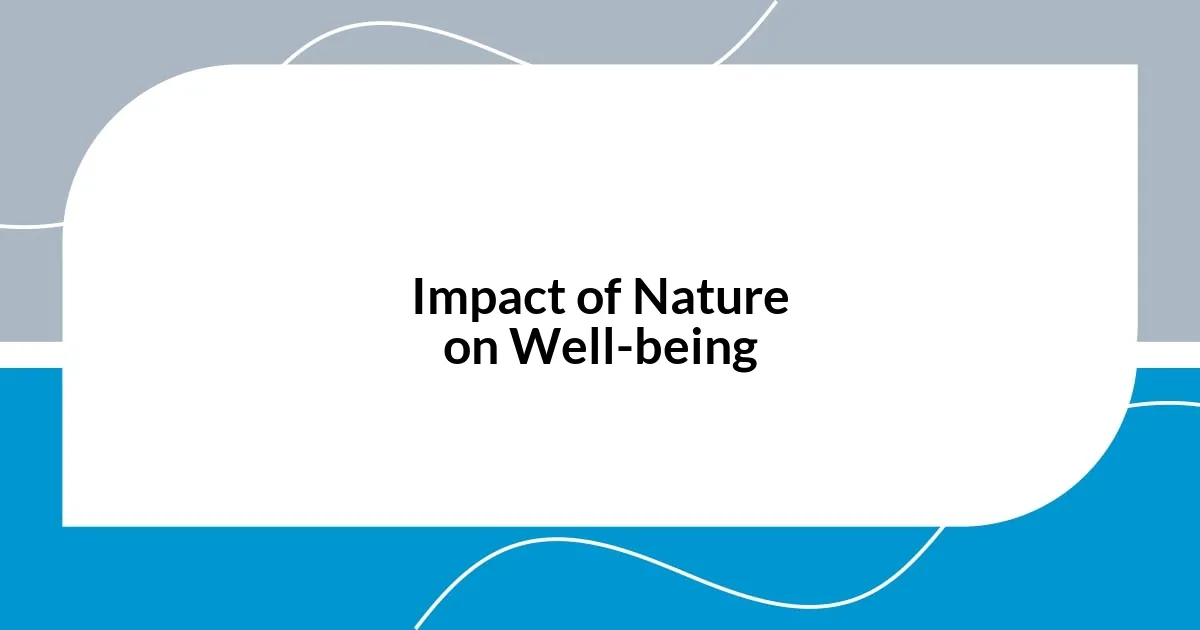
Impact of Nature on Well-being
The restorative effects of nature on our well-being are profound. For instance, I recall a particularly stressful week when I decided to take a break. I ventured to a serene lake, surrounded by towering trees and vibrant wildlife. Just listening to the gentle rustle of leaves and the water lapping at the shore eased my anxiety, reminding me how vital these experiences are for mental clarity.
Nature’s influence on our emotional health doesn’t just stem from serene settings. Engaging in physical activities outdoors, like hiking or even gardening, has always lifted my spirits. I remember one evening tending to my small garden after a long day, and as I interacted with the earth, I felt a deep connection to the entire cycle of life. It’s moments like these that reinforce my belief in the healing power of nature.
Interestingly, the scientific community backs up what I’ve felt intuitively. Studies show that spending time in nature can lower stress levels and decrease symptoms of depression. I often reflect on those studies while walking through a lush landscape, observing how my mood shifts positively. Being in natural environments truly enhances our quality of life in ways that words often struggle to encapsulate.
| Aspect | Impact on Well-being |
|---|---|
| Mental Clarity | Reduction in anxiety and stress levels |
| Physical Activity | Boosts mood and emotional resilience |
| Connection to Nature | Enhances overall life satisfaction |
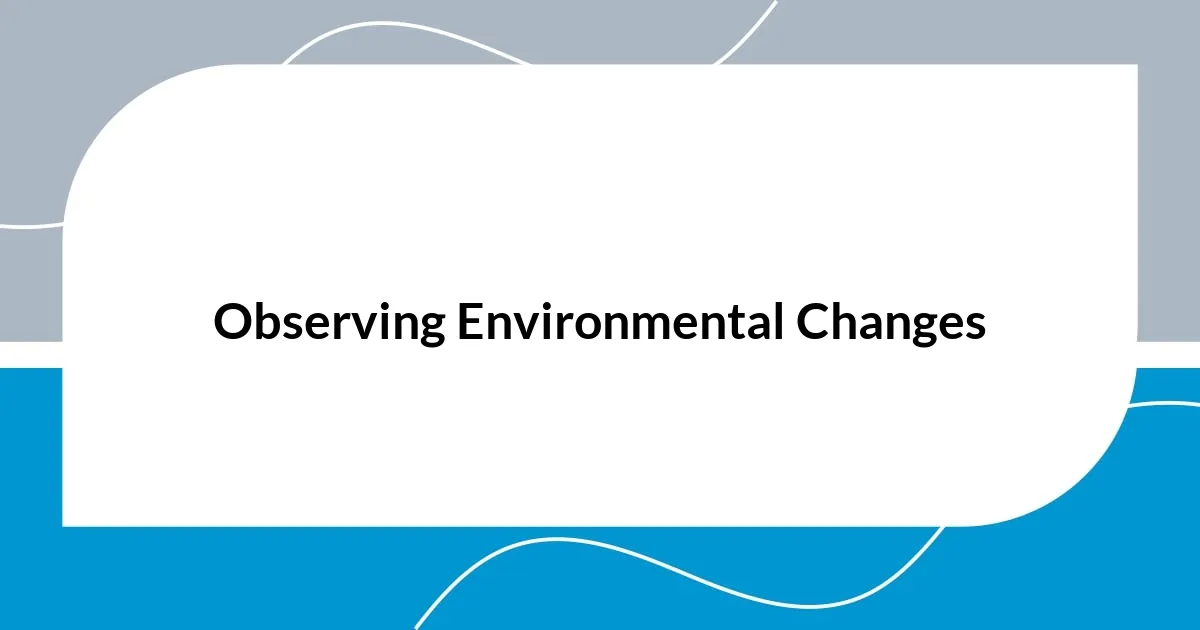
Observing Environmental Changes
The first time I noticed the subtle signs of environmental change was during a hike in the forest I frequented as a child. The vibrant greens that once danced in the sunlight had dulled, succumbing to shades of brown and brittle textures. This transformation stung, making me question, “What happened to the life that used to thrive here?”
During one chilly autumn, I watched as the leaves fell prematurely from the trees, a stark contrast to the seasons I remember. The woodland once alive with the chatter of squirrels and birds felt eerily quiet. That absence made me realize: nature’s rhythms are not just beautiful; they’re essential. Each change I observed felt like a whisper, urging me to pay attention and take action before it’s too late.
Now, every time I step outside, I’m more attuned to the shifts around me—the erratic weather patterns or the diminishing wildlife. It’s almost as if nature is sending me a message; it’s an intimate reminder that my choices matter. When I see these changes, a sense of urgency stirs within me. After all, my experiences in nature are not just memories; they are a call to protect what remains.
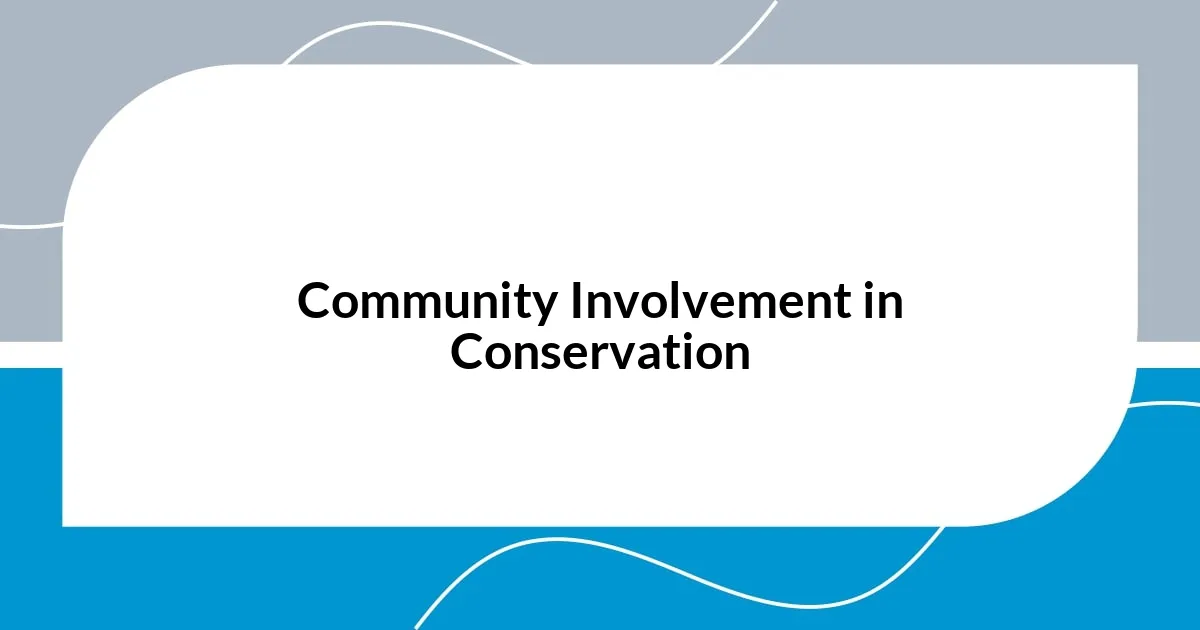
Community Involvement in Conservation
Community involvement in conservation is a powerful tool for fostering change. I vividly recall a weekend when my neighbors and I gathered to clean up a local park. The collective sense of purpose was palpable, as we chatted while picking up litter and planting flowers. It made me think, “What if everyone felt this sense of duty for their environment?” It highlighted just how impactful community efforts can be in creating cleaner, healthier spaces for everyone.
On another occasion, I participated in a community meeting where local residents shared their ideas for preserving a nearby wetland. The energy in the room was electric, fueled by a shared passion for protecting our natural resources. Some brought up stories of family picnics at the wetland from years ago. These personal tales wove a deeper connection between us and the land, reminding me that conservation isn’t just about the environment; it’s also about the legacy we leave for future generations.
When I see communities come together for conservation, I can’t help but feel a sense of hope. Whether through educational workshops or local clean-up days, I believe these collective actions create ripples of change. It makes me wonder: how can each of us contribute to this movement in our own unique ways? Engaging with my neighbors not only strengthens our bonds but also reinforces our shared responsibility to nurture the environment we all cherish.
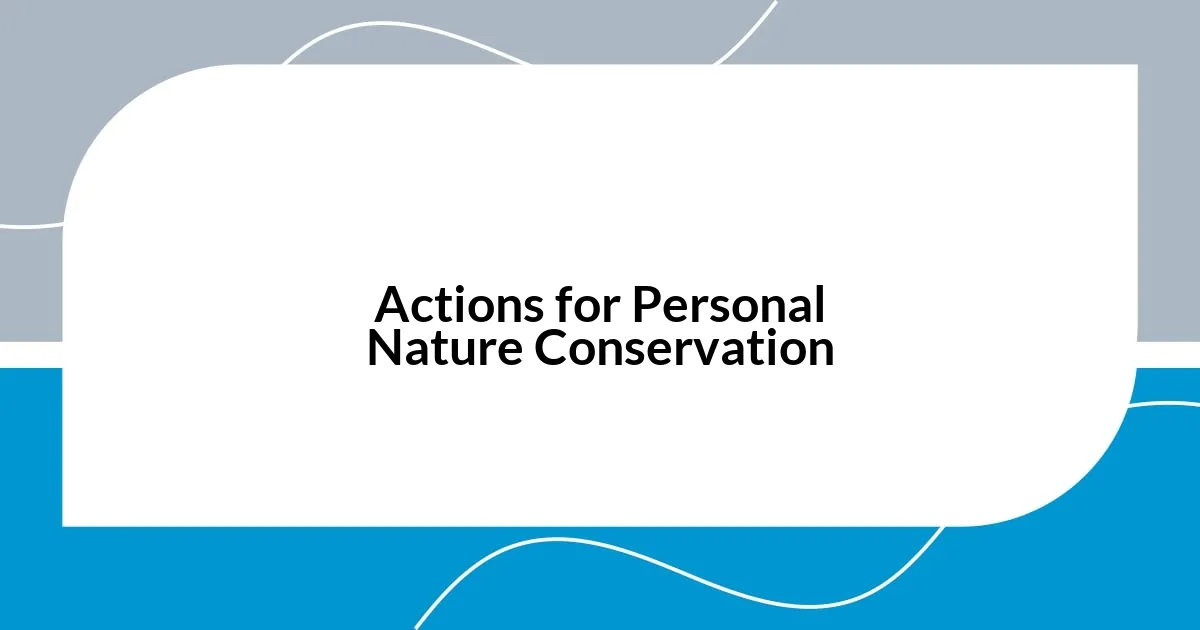
Actions for Personal Nature Conservation
Taking personal actions for nature conservation can start small but grow into meaningful habits. I remember when I decided to ditch plastic bottles in favor of a reusable one. It seems simple, right? Yet, every time I fill that bottle instead of grabbing a single-use option, it feels like a small victory. I think about how many people might join me, and that’s a motivating thought. What if each of us made just one conscious switch?
Volunteering for local tree planting initiatives has become a dream experience for me. I still have this vivid memory of my first event—digging holes under the sun, feeling the earth beneath my fingers, and planting a tiny sapling with my own hands. There was something magical about watching it stand tall in the days that followed. It became a part of a larger story; one tree turned into hundreds planted by passionate volunteers. Isn’t it incredible to think that your single action can contribute to a forest flourishing in the future?
On a more personal note, I’ve discovered that connecting with nature doesn’t always mean being physically outdoors. I advocate for digital minimalism, reducing my screen time to devote moments to simply sit outside and observe the beauty surrounding me. One evening, as I sat quietly on my porch, I found solace in watching fireflies dance in the dusk. That reflection reminded me: our mental space impacts our relationship with nature. How can we nurture our surroundings if we don’t first nurture our connection to them? Investing in both ourselves and the environment is a personal action we can all adopt.